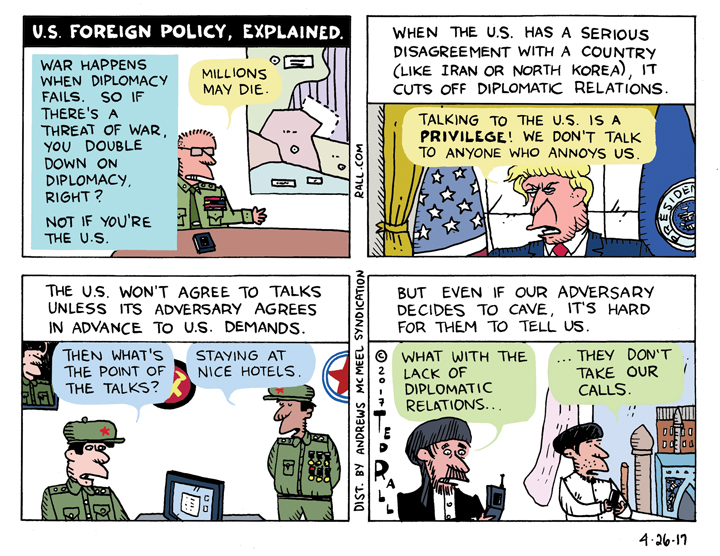The current nuclear crisis with North Korea highlights the foolishness of U.S. foreign policy, which treats the basic infrastructure of diplomatic contact as a reward to be granted to those who kowtow to American interests. Our policy insures that we don’t talk to the people to whom we should be talking the most.
U.S. Foreign Policy, Explained

Ted Rall
Ted Rall is a syndicated political cartoonist for Andrews McMeel Syndication and WhoWhatWhy.org and Counterpoint. He is a contributor to Centerclip and co-host of "The Final Countdown" talk show on Radio Sputnik. He is a graphic novelist and author of many books of art and prose, and an occasional war correspondent. He is, recently, the author of the graphic novel "2024: Revisited."

7 Comments. Leave new
America always looks the home of the brave when the rest of the world is forced to crouch and hide from the bully who can throw almost half of the world’s weapons at them on a whim, and without any restraint by lesser Americans on Thermonuclear Monarch, no matter how insane he might be at any given moment.
Yeah, we go back,Jack, and Do It Again – wheels turning round and round….
You tell yourself you’re not my kind…
Rikki don’t lose that number…
Actually, diplomacy is war by other means, and vice versa. The US ruling class and government can talk to anyone they want. Don’t mistake theater for reality.
Actually, anyone who talks to a Russian is considered to be compromised and a puppet.
Talking has been McCarthy-ized into weakness, and speaking without waving weapons in the face of other states is taken as evidence that the speaker fears escalation to mutual extinction.
“True” Americans are so brave that they don’t fear mutual extinction—not as much as they fear being called a sissy unwilling to kill.
That is why governors who run for president always try to add an execution to their campaign publicity. See Bill Clinton and George W. Bush.
Talk is cheap. Actions speak louder than words. 🙂
Alas, this notion of it being a privilege – a boon granted by the liege lord – to enjoy diplomatic relations with and be permitted to speak with diplomatic representatives of the United States of America is not something which Mr Trump dreamed up all on his own ; rather it dates at least to the end of WW II. Consider, e g, the case of relations between North Korea and the United States ; Article IV of the Armistice Agreement of 27 July 1953, signed for North Korea by General Nam Il and for the United States by Lieutenant General William Kelly Harrison jr, reads as follows :
«Recommendations to the Governments Concerned on Both Sides
60. In order to insure the peaceful settlement of the Korean question, the military Commanders of both sides hereby recommend to the governments of the countries concerned on both sides that, within three (3) months after the Armistice Agreement is signed and becomes effective, a political conference of a higher level of both sides be held by representatives appointed respectively to settle through negotiation the questions of the withdrawal of all foreign forces from Korea, the peaceful settlement of the Korean question, etc.»
The three month limit was not met, but nearly one year after the signing of the Armistice Agreement – from 26 April to 20 July 1954 – a conference was held in Geneva to deal with the issues raised in Article IV above. Due to the intransigence of the US side and that country’s unwillingness to discuss concrete proposals to settle the Korean question, no progress was made on these issues, and most people who have any knowledge at all of the Geneva Conference believe it was called to discuss the war in Indochina, which, discussions were, in fact, a late addition – 18 February 1954 – to the original agenda. Ever since that time, the North Koreans have been demanding that serious negotiations for a peace treaty between the two countries be held, as recommended above, and ever since that time, the US has adamantly refused to enter into any such….
Much can be laid at the feet of Mr Trump – and no doubt, much more will be laid there before he finishes his term of office (however that goes), but he can not be blamed for originating the fundamental distortion of the nature and purposes of diplomatic relations which seems to characterise US endeavours in the field….
Henri